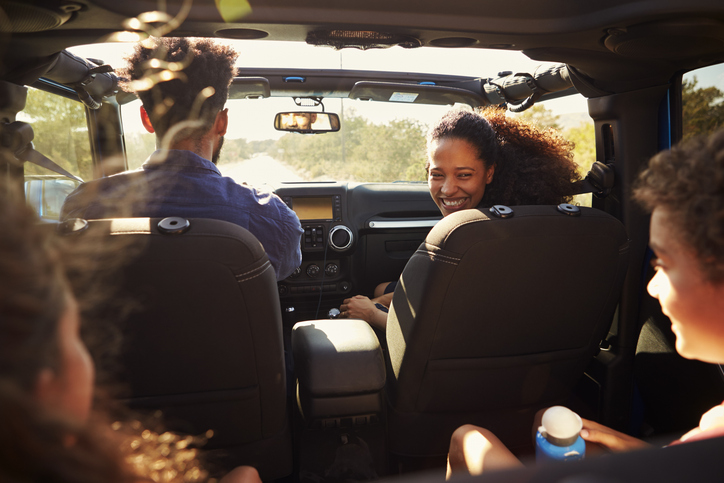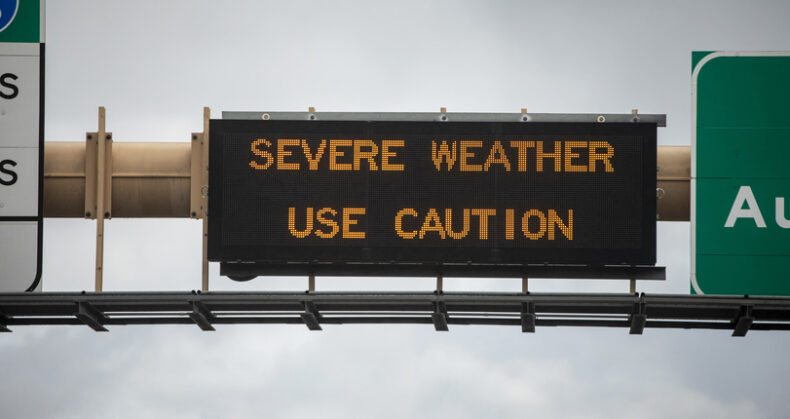
Summer is the perfect time for a road trip. However, the increased traffic, extreme weather, and road construction during the peak summer months can increase the risk of car accidents. From pre-trip preparations to avoiding road hazards, these top summer driving safety tips will help you keep yourself and your passengers safe.
11 Safe Summer Driving Practices
1. Equipment Maintenance for Extreme Heat
Extreme heat takes a toll on vehicles and can affect your vehicle’s braking ability. Ensure you regularly check your equipment maintenance. Keeping your vehicle well-maintained reduces the risk of mechanical failures and enhances overall safety on the road. Here is a car maintenance checklist to ensure you car is running smoothly.
- Check tires for signs of wear, cracks, or punctures
- Check tire pressure and rotate tires
- Ensure your vehicle’s cooling system has all the proper fluids, including brake fluid, transmission fluid, and coolant
- Check the engine oil
- Check the cabin air filter
- Ensure windshield washer fluid is filled
- Replace worn-out windshield wipers
- Make sure your battery is prepared for high temperatures
- Check the belts and hoses for cracks and fraying
- Test headlights, brake lights, and turn signals
2. Check for Recalls
Before embarking on a summer road trip, check for any recalls on your vehicle. Manufacturers issue recalls to address safety defects that could pose a risk to drivers and passengers. Visit the National Highway Traffic Safety Administration (NHTSA) website or your vehicle manufacturer’s website to see if your car has any outstanding recalls.
If a recall is identified, schedule the necessary repairs with an authorized dealer as soon as possible. Addressing recalls promptly ensures your vehicle is safe to drive and reduces the likelihood of experiencing issues during your trip.
3. Pack an Emergency Kit

Preparing an emergency kit is vital to any road trip. In case of a breakdown or emergency, having these supplies on hand can help you handle unexpected situations. Ensure you regularly check and update your emergency kit to ensure it is well-stocked and ready for use.
Here are the items that should be in your emergency kit:
- First aid kit
- Maps or GPS
- Bottled water
- Non-perishable snacks
- Spare batteries
- Flashlight
- Gloves
- Jumper cables
- Sun protection, including sunscreen and sunglasses
- Basic toolkit including a wrench, screwdriver, and pliers
- Spare tire, jack, and tire inflator
- Portable phone charger
- Blankets and jackets
- Emergency reflector triangle
4. Protect Your Eyes
Invest in a good pair of polarized sunglasses to reduce glare and improve visibility. Keep your windshield clean, both inside and out, to minimize reflections and streaks that can obstruct your view. Use your vehicle’s sun visors to block direct sunlight and reduce eye strain.
Avoid staring directly into the sun and take frequent breaks if your eyes become fatigued. By protecting your eyes, you can maintain better focus and visibility.
5. Be Aware of Extreme Weather Conditions

Weather conditions can change rapidly during the summer, so it’s important to check the summer weather patterns before and during your trip. Be prepared for thunderstorms, heavy rain, and other adverse conditions that can affect driving safety.
Extreme heat can cause serious damage to the engine and even lead to a fire. Don’t push your vehicle past the limit. Consider adjusting your travel plans to avoid dangerous conditions if severe weather is predicted. Listen to local radio stations or use a weather app while on the road to keep an eye on the weather.
Also, ensure you never leave children unattended in a car. Children are more vulnerable to heat stroke than adults. A child’s body temperature rises three to five times faster than an adult’s.
6. Don’t Drive Fatigued
Long road trips can be tiring, so it’s important to get plenty of rest before setting out and to take regular breaks to avoid fatigue. Also, be aware of signs of heat exhaustion, such as dizziness, nausea, and headaches, and seek shade or air conditioning if you experience these symptoms.
If you start to feel drowsy, pull over to a safe location and rest until you are alert enough to continue driving. If possible, share the driving responsibilities with other passengers who have a valid driver’s license. Maintaining your focus and staying alert helps you react quickly to any potential hazards.
7. Avoid Distracted Driving

Distracted driving is a common cause of traffic accidents in the US, resulting in over 3,000 traffic fatalities each year. It’s crucial to minimize distractions, especially during summer road trips. Ensure you set up your GPS and music playlist before starting your journey on the road.
Help limit distractions by setting your cell phone on Do Not Disturb mode. If you need to make a call or send a message, pull over to a safe location before using your cell phone. In addition, avoid eating, drinking, or engaging in other activities that take your hands off the wheel or eyes off the road. Ask passengers to assist with navigation and other tasks so you can focus on driving.
8. Be Extra Cautious Around Construction Zones
Due to extreme heat and weather conditions, summer is prime time for road construction, which can create hazardous driving conditions. Slow down and obey posted speed limits in construction zones. Watch for sudden lane changes, detours, and uneven road surfaces, as road construction can create hazardous driving conditions.
Be prepared for unexpected stops and remain patient, even if delays occur. Fines for traffic violations in construction zones are often doubled. By staying alert and cautious, you can navigate maintenance areas safely and avoid accidents.
9. Check for Pedestrians and Cyclists
With more people taking advantage of the warm weather to walk and bike, it’s crucial to be extra vigilant for pedestrians and cyclists. Always yield to pedestrians at crosswalks and be mindful of sharing the road. Check your blind spots carefully before changing lanes or making turns, as cyclists and pedestrians can be difficult to see.
Use extra caution when driving in residential areas, near parks, and around schools, where pedestrians and cyclists are more likely to be present. Being aware of your surroundings and respecting the rights of non-motorized road users helps prevent accidents and ensures everyone’s safety.
10. Identify and Address Your Vehicle’s Warning Signs

Understanding your vehicle’s warning signs is crucial for preventing breakdowns and ensuring a safe journey. Familiarize yourself with the meanings of different dashboard warning lights and pay attention to any unusual sounds or sensations while driving. If you notice warning lights such as the check engine light, tire pressure warning, or temperature gauge, address the issue promptly.
Pull over safely and consult your vehicle’s manual, or contact a mechanic if you’re unsure about the problem. Ignoring warning signs can lead to more serious issues and potentially leave you stranded, so it’s important to respond to them immediately.
11. Never Drink and Drive
Driving under the influence of alcohol is extremely dangerous and illegal. Even small amounts of alcohol can affect your driving abilities. Alcohol can impair thinking, reasoning, and muscle coordination. Each day, about 37 people are killed in drunk-driving crashes. In 2022, over 13,500 people lost their lives in traffic crashes that involved a drunk driver.
About 28% of drunk-driving-related fatal crashes happen during the summertime. If you plan to drink, ensure you have a designated driver or utilize public transportation or a ride-sharing service.
We Represent Car Accident Victims
If you’ve been injured in a car accident caused by another person’s negligence, an experienced car accident lawyer will protect your rights and fight for the compensation you deserve. At Harbor Accident Lawyers, our personal injury attorneys specialize in representing car accident victims and have recovered millions of dollars in compensation for our clients.
Our dedicated team of San Diego personal injury attorneys will work diligently to investigate your case, gather compelling evidence, and negotiate with insurance companies on your behalf. We understand that car accident victims often deal with serious injuries, costly medical bills, lost wages, mental distress, and pain and suffering. We are committed to helping you obtain justice and recover the compensation you deserve. Contact us today for a free consultation and let us support you in your recovery.
